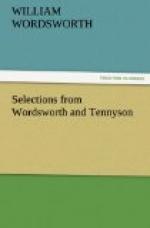“Tennyson is many sided; he has a great variety of subjects. He has treated of the classical and the romantic life of the world; he has been keenly alive to the beauties of nature; and he has tried to sympathize with the social problems that confront mankind. In this respect he is a representative poet of the age, for this very diversity of natural gifts has made him popular with all classes. Perhaps he has not been perfectly cosmopolitan, and sometimes the theme in his poetry has received a slight treatment compared to what might have been given it by deeper thinking and more philosophical poets, but he has caught the spirit of the age and has expressed its thought, if not always forcibly, at least more beautifully than any other poet,”—Charles Read Nutter.
“In technical elegance, as an artist in verse, Tennyson is the greatest of modern poets. Other masters, old and new, have surpassed him in special instances; but he is the only one who rarely nods, and who always finishes his verse to the extreme. Here is the absolute sway of metre, compelling every rhyme and measure needful to the thought; here are sinuous alliterations, unique and varying breaks and pauses, winged flights and falls, the glory of sound and color everywhere present, or, if missing, absent of the poet’s free will. The fullness of his art evades the charm of spontaneity. His original and fastidious art is of itself a theme for an essay. The poet who studies it may well despair, he can never excel it; its strength is that of perfection; its weakness, the ever-perfection which marks a still-life painter.”—Edmund Clarence Stedman.
“A striking quality of Tennyson’s poetry is its simplicity, both in thought and expression. This trait was characteristic of his life, and so we naturally expect to find it in his verse. Tennyson was too sincere by nature, and too strongly averse to experimenting in new fields of poetry, to attempt the affected or unique. He purposely avoided all subjects which he feared he could not treat with simplicity and clearness. So, in his shorter poems, there are few obscure or ambiguous passages, little that is not easy of comprehension. His subjects themselves tend to prevent ambiguity or obscurity. For he wrote of men and women as he saw them about him, of their joys and sorrows, their trials, their ideals,—and in this was nothing complex. Thus there is a homely quality to his poems, but they are kept from the commonplace




